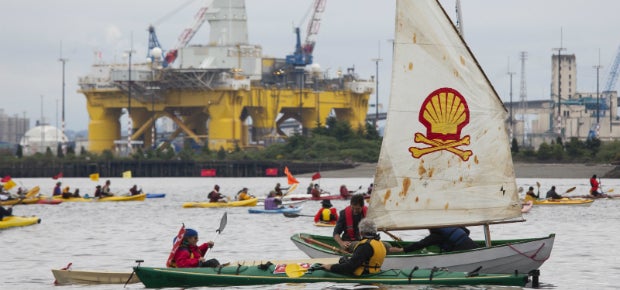Green fury after Shell is given go-ahead for Arctic drilling
US President accused of ‘double-speak’ by activists as Hillary Clinton joins chorus of criticism

Your support helps us to tell the story
From reproductive rights to climate change to Big Tech, The Independent is on the ground when the story is developing. Whether it's investigating the financials of Elon Musk's pro-Trump PAC or producing our latest documentary, 'The A Word', which shines a light on the American women fighting for reproductive rights, we know how important it is to parse out the facts from the messaging.
At such a critical moment in US history, we need reporters on the ground. Your donation allows us to keep sending journalists to speak to both sides of the story.
The Independent is trusted by Americans across the entire political spectrum. And unlike many other quality news outlets, we choose not to lock Americans out of our reporting and analysis with paywalls. We believe quality journalism should be available to everyone, paid for by those who can afford it.
Your support makes all the difference.Shell has been granted final permission by the US regulatory authorities to begin exploratory drilling for oil and gas beneath the Arctic seabed. The decision by the Bureau of Safety and Environmental Enforcement (BSEE) to allow the multinational to drill off the Alaskan coast prompted environmentalists to accuse President Barack Obama of “double-speak” over his calls to replace fossil fuels with renewable energy sources.
Shell has spent some $7bn (£4bn) over the past seven years getting ready to access what it expects to be vast amounts of oil and gas under the Beaufort Sea. But activists have warned of catastrophic consequences for the fragile Arctic ecosystem should an accident occur.
The Anglo-Dutch energy giant has been moving equipment to its Burger prospect, about 70 miles from the Alaska shore, all summer, including the towering Polar Pioneer drilling rig. But all work on drilling beneath the sea bed has been put on hold pending the arrival of a safety vessel, the Fennica; this is carrying a capping stack designed to control blow-outs at wells.
This summer, Greenpeace protesters had suspended themselves from a bridge in Portland, Oregon, in attempt to stop the Fennica leaving for the Arctic after the ship underwent dry-dock repairs in the city. “Kayaktivists” also tried to block the icebreaker’s path.
The BSEE announced it had given permission for Shell to start drilling as the Fennica neared the Burger prospect this week.
Although the Arctic potentially offers vast untapped resources of oil and gas, extracting it is extremely difficult and risky, and it could be at least 10 years before any commercial production begins, analysts said.
Shell, however, welcomed the decision by the US government to allow it to proceed and sought to reassure stakeholders that it would operate safely in the pristine Arctic environment. “We remain committed to operating in a safe, environmentally responsible manner and look forward to evaluating what could potentially become a national energy resource base,” a company spokesman said.
But investors were unimpressed, with Shell shares falling 29.5p to 1,782.5p.
The BSEE’s director, Brian Salerno, added: “Activities conducted offshore Alaska are being held to the highest safety, environmental protection, and emergency response standards. We will continue to monitor their work around the clock to ensure the utmost safety and environmental stewardship.”
The timing makes sense for Shell from an operational standpoint. The company has only until the end of September to try to strike oil or gas before deteriorating weather and ice accumulation will force a pause.
But politically it is awkward for the White House. Breaking with Mr Obama on the issue, Hillary Clinton said in a Twitter message that the perils of drilling in the Arctic outweighed the potential rewards. She wrote: “The Arctic is a unique treasure. Given what we know, it’s not worth the risk of drilling.”
The decision also comes just three weeks after Mr Obama took a stand on climate change by ordering drastic cuts in emissions from power plants. And just before leaving for his summer break in Martha’s Vineyard, Mr Obama announced he would be visiting Alaska for the first time as President at the end of this month to highlight the perils of climate change in the Arctic. While there he will attend a regional summit of foreign ministers in Anchorage that will be dedicated to discussing the topic.
The conflicting messages of Mr Obama going to see “melting glaciers” in the Arctic, while at the same time unleashing Shell in the Beaufort Sea, were underscored by May Boeve, executive director of the climate-activist group 350.org. “If this White House is serious about its legacy on climate action, it’s time to stop the doublespeak and finally begin aligning the action with the rhetoric,” she said.
In Britain, the Green Party energy spokesman, Andrew Cooper, also lamented the decision. “It is incredibly disappointing to see Shell being given the green light for this risky and environmentally destructive endeavour at a time when governments should be doing all they can to curb the use and extraction of fossil fuels,” he said. “It is especially disheartening to see this project given the go-ahead so soon after President Obama appeared to be making positive steps towards tackling climate change.”
Anxiety about Shell’s Arctic operations springs in part from the trauma of the Deepwater Horizon disaster in the Gulf of Mexico five years ago. BP, which operated that well, has just now reached an $18.7bn settlement with states and local governments that suffered from the event. Environmentalists warn that any such spill in the Arctic would be far more difficult to handle, not least because colder water would stop any natural breaking down of the oil.
Join our commenting forum
Join thought-provoking conversations, follow other Independent readers and see their replies
Comments